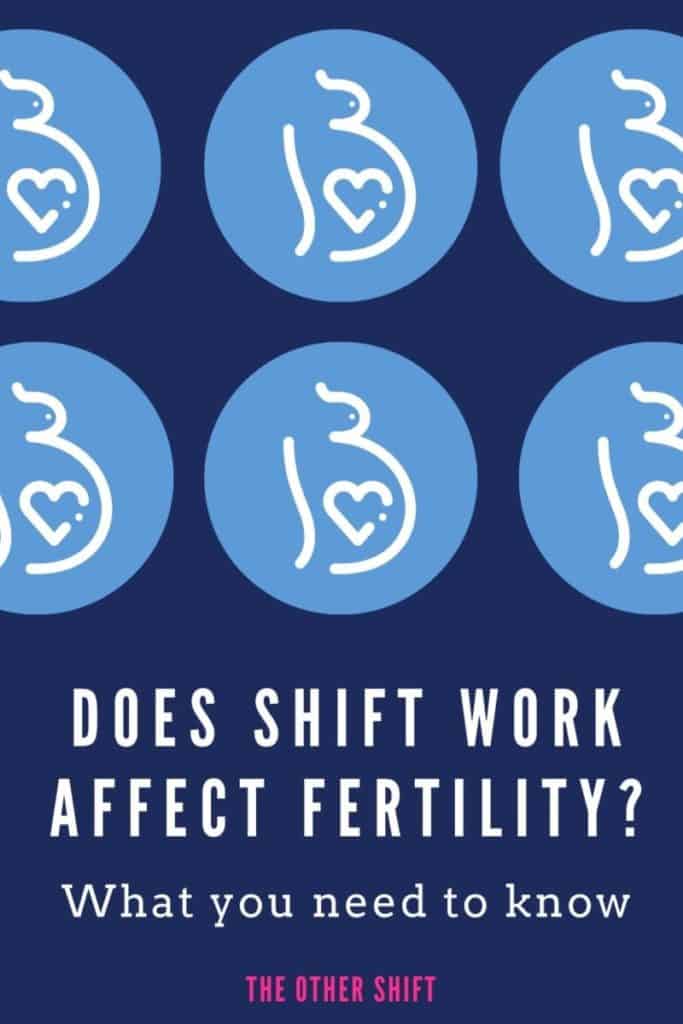Disclosure: This page may contain affiliate links, meaning we receive a commission if you decide to make a purchase through our links, but this is at no additional cost to you. Please read our disclosure and privacy statement for more info.
Families who are trying to conceive a child often wonder whether or not their everyday actions could affect their chances of conception. This is especially true for women and men who find that conception does not happen for them as immediately as it seems to happen for other seemingly healthy couples. If you are trying to conceive whilst working a rotating roster, then you might be wondering whether or not your shift work schedule impacts your fertility.

Shift work does not impact fertility as a standalone, however significant research shows us that sleep issues and heightened stress can affect the menstrual cycle of certain women. If your shift work circumstances are causing you concerns in these areas, then this would impact your chances of conceiving.
While every woman is unique and different, there are certain factors that could affect your fertility in regards to your work schedule. This is not a simple issue, so join us as we explore the ways that your fertility is directly impacted by the hours you work.
Trying to Conceive as a Shift Worker
Congratulations! Trying to conceive is a huge step for any family. Whether this is your first child or your tenth, trying to conceive is exciting. However, this time can also be incredibly stressful.
On average, couples who are trying to conceive will be successful within 6 months to a year according to an article on Healthline.
However, there are a number of other factors that could also be affecting your fertility. From your age to your eating habits, your weight and even underlying issues with your menstrual cycle that may or may not have been discovered just yet.
Unless your doctor is already aware of an underlying issue, he / she will probably recommend that you try to conceive naturally for the first year. If you are unsuccessful during this time, then your doctor might be willing to discuss other options available to you.
During this period, it can be frustrating to wait to find out if you are able to conceive naturally or if anything is keeping you from a successful conception. We guess that this is probably why you are reading this article in the first place. To understand how your shift work might be affecting your fertility chances.

What is Female Fertility?
Before we can explore whether or not shift work is harming your fertility, we need to clearly define fertility and take a look at the things that could be impacting it.
When you are trying to conceive, understanding all of the factors that could be at play is crucial. Fertility is still at a scientific stage of research and unfortunately doctors do not have all of the answers right now.
Because fertility is so complicated, it is important for women and men who are trying to conceive to have a clear picture of the most common causes of infertility before we dive into our topic of shift works effect on fertility.
Some women might wonder if their family’s fertility history could increase or decrease their chances of conception. Unfortunately, each and every woman is different. We’ve not found a connection between your mother’s ability to conceive and your ability to conceive.
Some research even suggests that patients who undergo fertility assistance often have no family history of infertility. Still, it is possible for mothers to pass down genetics that are less than favorable to conception. The most common of these conditions are known as Endometriosis and Poly Cystic Ovarian Syndrome.
Either of these conditions can affect your ability to conceive a child naturally. However, neither of them is necessarily a diagnosis for infertility. It is unlikely that you would suffer from either of these conditions without knowledge of it. Both of these conditions have symptoms that allow your OBGYN to suspect that the condition may be present. Endometriosis usually requires exploratory surgery to diagnose. On the other hand, Poly Cystic Ovarian Syndrome can usually be diagnosed through an ultrasound.
Older women are also considered to be at a higher risk for infertility. This is because it is a possibility that there are fewer eggs to be fertilized. In this event, however, a doctor is usually willing to work more closely with her before the one-year period of trying to conceive is up.

What is Male Fertility?
Male fertility generally refers to the male’s sperm count and sperm quality. It is far less likely that a male will be the cause of infertility than a female. However, it certainly is possible.
Unfortunately, fertility doctors are not entirely sure of the possible causes behind male infertility. Some research suggests that there might be a genetic factor at play, although as we can tell, none of this information has ever been confirmed by any major tests.
Does Working Day Shift Affect Your Fertility?
People who work the day shift are far less likely to have affected fertility because of the shift that they work. Although, there might be some struggles that appear with this shift because of other issues.
However, it is unlikely that working the dayshift will affect your menstrual cycle in any way that could reduce your chances to conceive.
However, working in any job that has a shift work schedule usually signals that you are working in a highly stressful environment. Research confirms that there are several ways that increased stress can actually affect your fertility.
First on the list of ways that stress can affect your fertility is simply that your body is able to detect stress. According to Web MD, your body understands that stressful times are not ideal for conceiving a baby. This is unfortunate and can actually cause even more stress in women who are trying to conceive.
Stress is also known to make both women and men have a harder time doing the deed.
During periods of extreme stress, finding the time and the desire to do a baby dance with your partner is difficult. Whether you like it or not, the baby dance is required if you want to conceive a child without medical intervention.
Speaking of doing the deed, the day shift worker might have trouble finding the time to do the deed on the right day for conception to occur. If your most fertile days happen to fall on your working days, then it might be more difficult find the time and the strength to schedule what is necessary.
So, while working the day shift does not affect your fertility in the same way that working the night shift will affect it, it is true that the day shift can take its toll. However, day shift workers are a far less likely shift to be affected as far as their fertility goes.

How Night Shift Affects Your Fertility
There are a number of ways that your night shift schedule could affect your chances of conceiving. However, none of these ideas have ever been proven beyond a reasonable doubt by scientists in the field of fertility.
So, women are urged by scientists in the field to remain cautious because determining exactly what is causing fertility issues can be largely guesswork when it comes to irregular schedules.
According to Web MD, there was a study conducted on women who were undergoing fertility treatment and researchers found that women who worked the night shift tended to produce less mature eggs.
Producing less mature eggs does not mean that you cannot get pregnant without medical intervention. However, this phenomenon could affect a woman’s fertility, especially if combined with other outlying factors.
Further, there is evidence that your circadian rhythm directly affects a woman’s cycle. Your circadian rhythm refers to the natural sleep cycle that your body follows based on lightness and darkness happening outside.
Women who work the night shift have a disrupted circadian rhythm. This can actually prohibit your body from producing the correct hormones which will produce ovulation. Obviously, ovulation must occur for conception to occur.
Although there is some scientific evidence to show that the circadian rhythm can affect your fertility, the truth is that this is not entirely understood by the scientific community. Someone who struggles with fertility might be experiencing any number of issues that could be contributing to the problem.

Mixed Shifts and Fertility
A mixed shift is defined by a shift that rotates between days and nights. Several doctors who specialize in fertility have noted that a mixed shift tends to be the most likely cause of infertility when compared to all of the other types of shifts.
With a night shift, for example, women can still manage to create a healthy sleeping schedule. Following guidelines for healthy sleep by anchoring their sleep and darkening their room can help tremendously. The women who work a steady shift are at the very least on a steady routine that their body can predict.
Mixed shifts, however, are far more stressful on the body than any other form of shift work that there is. With a mixed shift schedule, there is no way to anchor your sleep. Switching from nights to days on a routine basis is going to cause significantly disrupted sleep patterns.
Significantly disrupted sleep is not healthy for the body. Your body will quickly become confused and it would be easy for your hormones to be thrown off by this type of unpredictable schedule. This type of schedule when combined with a lack of sleep might also cause a significant increase in your stress level.
All of these factors combine to create the perfect storm of messing up your ability to conceive. If your hormones are out of whack, then predicting your ovulation is going to be more difficult. Further, the increased stress might make getting in the mood a little bit more difficult than normal. Finally, a schedule that is constantly changing is going to add increased difficulty into getting to schedule the baby dance on the proper days.

How to Overcome the Infertility
If you are trying to conceive and looking for ways to overcome your work-schedule challenges, then there are a few things that you can do to help.
Increasing your odds of conception is easier than ever with so many tools available to help you accomplish this goal. It is important to note that these tips are not necessary for child conception, but if you are concerned about how your work schedule might be affecting fertility, these tips might help you understand what is going on with your body a little bit better.
Keep in mind that conceiving a child is largely based on luck. Each month, there are only 1-2 days when you are at your peak fertility. This means that if you are doing the deed on a regular basis, but you miss those 1-2 days then your chances are significantly reduced. This is why getting pregnant can be so difficult for even those who do not have any fertility struggles, the chances of getting pregnant are not super high to begin with.
Prepare for Pregnancy
There are a few things that you can do to prepare your body for pregnancy. Being overweight, for example, can increase your chances of fertility struggles as well as your chances for miscarriage. As you are beginning your fertility journey, you might consider light exercise or dieting to shed a few pounds.
Obviously, if you have been using any form of birth control, now is the time to go ahead and stop using that birth control method. You might also consider taking prenatal vitamins to go ahead and build up your body’s storage of the necessary vitamins to support the healthy growth of a baby.

Track Your Cycle
There are a variety of different methods that women use to track their menstrual cycle each month. In fact, there are plenty of women who choose to track their menstrual cycle in order to avoid pregnancy instead of taking birth control. This can be an extremely beneficial tool for understanding your cycle, but for women with irregular periods, it can be harder to track.
There are several applications that you can download to your phone which will help you track your monthly cycle. These applications allow you to log the first day of your period along with other symptoms of your monthly cycle. As time goes on, these apps try to figure out patterns within your cycle that can help the app understand which days are your most fertile.
Many of these apps also have features that will allow you to input data from some of the other methods that we will discuss for overcoming fertility. All of this data gathered together is the best way to boost your chances of conception.
Related post: Shift Work While Pregnant: Survival Tips from 46 Busy Moms
Track Your Basal Body Temperature
Tracking your basal body temperature is going to be more difficult for the shift worker. However, unless you work a mixed shift, it is still possible to track your basal body temperature. This is a method for gathering data to track which day of the month your ovulation is most likely to occur.
In order to track your basal body temperature, you will need a thermometer that can detect minute changes in body temperature. Each day, at the exact same time during your sleep, you will take your basal body temperature.
This is why this method is more complicated for those working the night shift. Just be sure that you track this after your body has been at rest (during your sleep) and at the exact same time each day.
Essentially, you will notice a spike in your basal body temperature during the three days that follow ovulation. This will help you to understand how many days occur between the start of your period and ovulation. Because this is different for every woman, it will help you understand which days are the most important for you to do the deed each month.
Use Ovulation Tests
One of the easiest ways to make sure that you are doing the deed on the lucky days of the month is to use an ovulation prediction kit. These kits are able to detect the LH hormone that will appear in your urine before ovulation occurs in your body.
Usually, these ovulation prediction kits come with several ovulation tests. Much like a pregnancy test, you simply urinate on the test or dip the test into your urine to detect the LH hormone. Unfortunately, the results are a little bit harder to decipher than a pregnancy tests though.
Before you can take an ovulation test, you should have some vague guess as to when you might ovulate. You should begin testing your urine around two days before you suspect that ovulation is going to occur.
There will always be two lines that appear on an ovulation predictor test, even if the test is negative. When your LH hormone is surging, the test line will be as dark or darker than the control line. When you see this result, you will know that it is time to do the deed in order to dramatically increase the chance of conceiving.
Check out the two products I found on Amazon below which are incredibly popular and very useful at predicting ovulation.
Summary: Does Shift Work Affect Fertility?
Worrying about infertility is one of the most lonely struggles to go through. Especially during the first year of trying to conceive, there are so many factors that a woman could worry about which she believes is causing her struggle.
The good news is that working the night shift or rotating roster is not going to 100% ruin your chances of conception.
However, if you are concerned about your schedule impacting you, give our suggestions a go and see how things change.
You might be surprised how quickly you find a bundle of joy cooking in the oven!

Disclosure: This page may contain affiliate links, meaning we receive a commission if you decide to make a purchase through our links, but this is at no additional cost to you. Please read our disclosure and privacy statement for more info.





